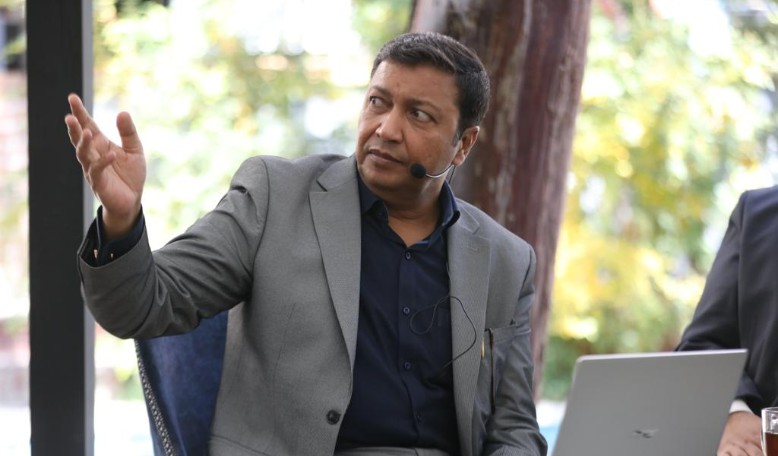2021 Mustafa(Pbuh) Prize laureate presents his drug discoveries for Epilepsy, Leishmaniosis
During the Mustafa(Pbuh) Prize Science Café held on the theme of “medicinal plants under the inspection of modern science,” Pakistani scientist in the field of Organic Chemistry and the 2021 Mustafa(Pbuh) Prize laureate, delivered a speech on his discovery of medicinal plants for Epilepsy and Leishmaniosis diseases.
MSTF Media reports:
The Mustafa
Science and Technology Foundation (MSTF) held a Science Café on October 20, 2021, with the presence of Muhammad Iqbal Choudhary, Director of International Center for Chemical and Biological Sciences (ICCBS), Coordinator General COMSTECH, and one of the 2021 Mustafa
Prize laureates from Islamic countries.
The event also hosted Aziz Latif Jamal and Nadira Panjwani as other representatives of ICCBS, in addition to experts in the field of Biochemistry.
The majority of the participants were students from different universities.
Choudhary began his speech by stating “Iran is my second home,” and then proceeded to talk about “the fascinating world of chemistry.”
Chemistry is “central science,” he said, noting that “from feelings to health all is nothing but an interplay of tiny molecules.”
He talked about the gifts that science through different scientific areas has bestowed upon the humanity in the present era, highlighting that “science is our future.”
“Your destiny is to get ready to live beyond 100 years,” he said.
He decided to examine “miraculous herbs and other natural products” from a scientific perspective, he continued.
Choudhary further talked about traditional knowledge and drug discovery. “The systematic evaluation of indigenous ethnomedicinal practices in order to contribute to an improved health care in marginalized regions has been an effective approach for drug delivery against neglected and poor men diseases,” he said.
He hinted at Nobel Prizes awarded based on discoveries in the realm of natural products and elaborated on blockbuster drugs from natural products such as Penicillin, vincristine, Taxol, and Artemisinin.
Presenting his research, he said “Our strategy was surveying all over Pakistan to collect ethnobotanic knowledge.”
“We isolated lots of compounds as a result,” he continued.
Talking about issues and challenges of epilepsy disease, he said “around 50 to 60 million people suffer from epilepsy.”
“Approximately 90% of epileptic patients in developing countries are not receiving appropriate treatment,” he added.
Choudhary and his team have conducted a nation-wide ethnobotanic survey for the medicinal plants used in epilepsy.
He drew attentions to the experience of an epileptic patient who has been using delphinium roots for managing epilepsy.
He said they have found out that “isoxylitones are the most potent, broad spectrum of anti-epileptic natural products identified from the plant delphinium denudatum.”
“We discovered that using the root of this plant helps to epileptic patients, so out of it we developed a nasal spray effective for 98% of epileptic patients,” he explained, emphasizing that it is “an aromatic medicine.”
They have got patents from the European Union, China, and the US for this novel discovery.
In the area of Neglected Tropical Diseases (NTD) such as Malaria, Leishmaniosis, and scabies, they have conducted research on Leishmaniosis disease which is “a major health problem in four epidemiological regions of the world: The Americas, East Africa, North Africa, West and South East Asia.”
“It is the second most prevailing tropical disease after malaria,” Choudhary said, adding they have discovered that “three plants are efficient against this disease, one of which is garlic (Allium sativum).”
“On the whole, what we did was that we collected data from people, got plants from the nature, used our knowledge of Chemistry, and combined them all these together to develop efficient medicines against diseases,” he concluded.
Parvin Pasalar, Professor at Tehran University of Medical Sciences, was another speaker of this event. She gave an introduction to drug, underscored spiritual well-being as an important component of the definition of health, and explained molecular level of health vs holistic health.
She said that to find or produce drugs, there are many ways such as “natural products, different extracts, extraction of different molecules, modifying the existing molecules, and designing drugs.”
The next speaker was Azadeh Habibi, Full Professor of Biochemistry at Endocrinology and Metabolism Research Institute at Tehran University of Medical Sciences. Her expertise is focused on modelling and simulation in medical sciences.
She explained that “drug discovery process takes about ten years to reach a result.”
She said some potentially medicinal compounds are based on traditional medicine which is mostly focused on medicinal plants.
“Research on the study on physiopathology is predominantly conducted by experts of fundamental sciences,” she noted.
Habibi chiefly talked about computational methods in ligands structures, in investigation on small molecules atoms/electrons, in drug targets structures, in protein modeling specially in modeling proteins with Alpha-fold, in docking specially by virtual screening, in simulations specially in molecular mechanics, in pharmacophore, and in COVID-19.
Mohammad Mahdavi, Assistant Professor at Endocrinology and Metabolism Research Institute, gave a presentation on natural bioactive heterocyclic compounds. He elaborated on the “design and discovery of novel α-glucosidase inhibitors.”
Among the many research projects they have done in this area is Benzoylquinazolinone derivatives which work as “new potential antidiabetic agents,” Mahdavi said.

